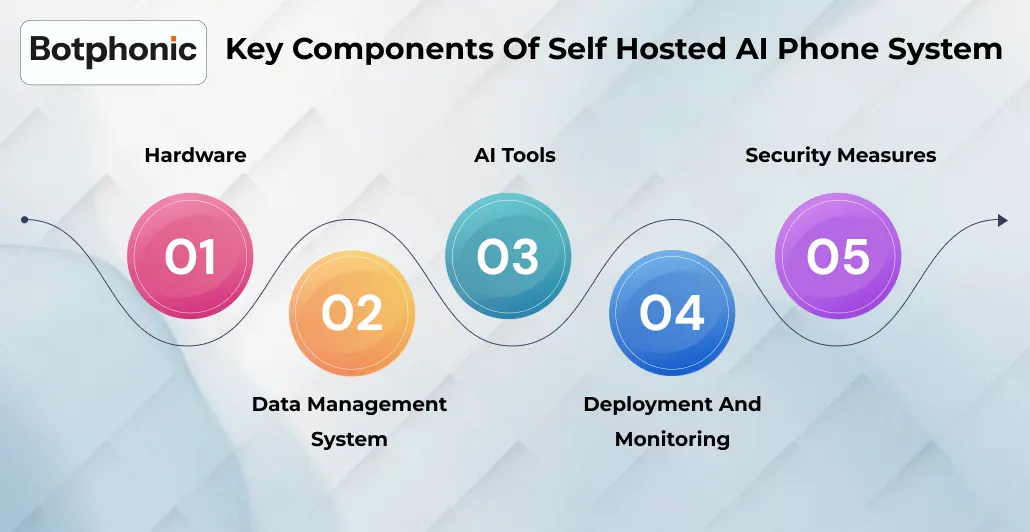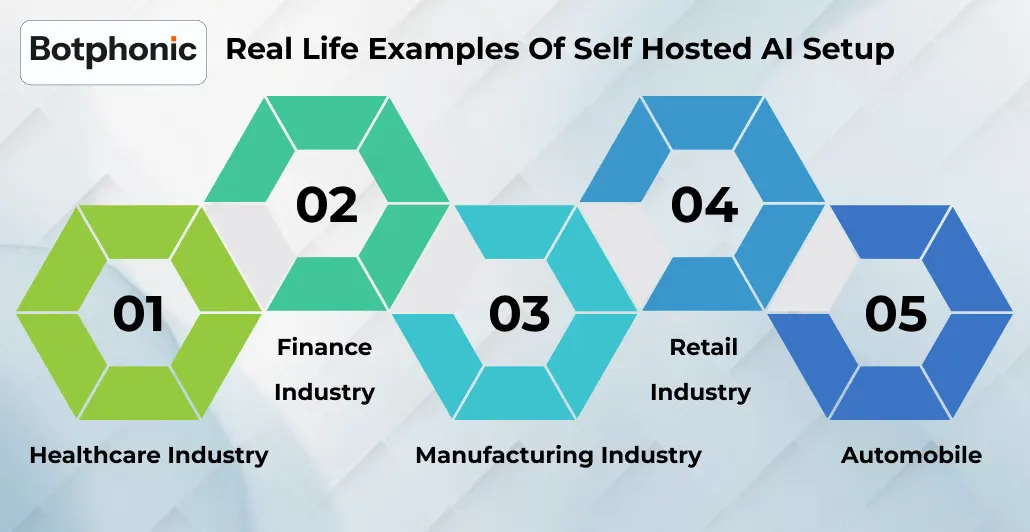
Summarize Content With:
Summary
A self-hosted AI phone system is capable of providing unmatched control over your data and privacy. But know that it comes with certain challenges too. This guide will help you understand pros, cons and certain aspects necessary before you get your self-hosted system.
Introduction
Everyone is discussing the application of self-hosted AI phone systems. And it’s not just a hype but a technology that has potential to change the way businesses manage their customers. These days there’s a huge debate among enterprises that should they trust their sensitive data on vendors and outsource AI services or have their private systems? Increasing worries regarding security issues, costs and hallucinations are making people worry about it.
In this text we will cover details on self-hosted AI phone systems, its importance and how it functions. We will also discuss case studies that changed their path and their results. Also if you are looking to get expert help, Botphonic AI can guide you at each step.
What are self-hosted AI phone systems?
Self hosted AI phone systems are applications which are based on their own infrastructure rather than being hosted on third party cloud servers. These solutions let companies control the operations of their AI call assistant. They can have access to everything from management of data, updates and even deployment models.
For self hosted AI setups companies can deploy on premises, cloud based or hybrid. The unique feature is that companies can be owners and have insights of the system. It helps them keep track of data and hardware resources.
You can imagine getting a self-hosted AI phone system as having your own coffee machine rather than ordering it from any store. Hence your data never goes out of the office with this kind of system.
Key components of self hosted AI phone system

When you implement self-hosted AI phone systems it involves following components:
- Hardware: It is necessary for organizations to have an excellent hardware infrastructure. It consists of GPUs, TPUs and accelerators for supporting the nature of AI workloads.
- Data management system: AI has to be fed with the necessary information. Hence your infrastructure should have facilities to ensure storage, retrieval and management systems. It consists of databases or warehouses.
- AI tools: Self-hosted AI depends on open-sources frameworks that are necessary for training and deploying it.
- Deployment and monitoring: For ensuring proper functioning it is necessary to have tools for deployment and monitoring. For this you can use platforms that provide better insights.
- Security measures: One of the most crucial things to do is ensure the security of your AI tool. Implementation of robust security measures like encryption, access control and more can be great.
Why do companies choose self hosted AI phone systems?
Self-hosted AI is the talk of town for business owners. So why not explore the reason behind companies choosing it:
- Ownership over data: When you opt for a self-hosted AI phone service you get complete ownership of your data. It could be a great way to comply with security rules and protect intellectual property.
- Customizable: Not each company has the same workflow and same needs. Hence customizable workflows and models is one of the reasons why companies opt for self-hosted models.
- Costing Considerations: By implementing self-hosted AI solutions companies can be aware of future costs. So it can help them avoid potential high costs followed by cloud systems.
- Better security: When you have an internal AI system it can reduce the chances of external threats and vulnerabilities.
- Compliance: Again having an in-house AI infrastructure means you don’t have to stress much about compliance with specific regulations.
Challenges of self hosted AI phone system
Self-hosted AI comes with certain challenges that can make implementation a problem. Here are those:
- More initial investment: You will have to think about a huge amount that you will have to pay at first for infrastructure. This amount involves cost for hardware, software and people to operate it.
- Complexity: When you opt for self-hosted platforms instead of cloud ones, know that they are far more complex. Hence you will need a person who is knowledgeable about the field.
- Maintenance and update: Before you equip this model, know that you will have to run after maintenance and update. You have to scale it as your business grows. It could be a draining task.
- Gathering talent: Running a self hosted model needs a team or expertise. And it’s a challenging task to seek a team with a good idea of AI and IT infrastructure. And it can be costly too.
Real life examples of self hosted AI setup

Here are case studies that can help you understand better about it:
1. Healthcare industry
Philips healthcare is known to employ self-hosted AI solutions to make diagnostic and patient monitoring systems more efficient. Additionally deploying on-premises can ensure data privacy. It can also help them integrate it directly with their medical devices. They can adhere to strict healthcare regulations and provide personalized treatment plans.
2. Finance Industry
A finance industry tycoon named JPMorgan has been using self-hosted AI for applications such as detecting fraud, managing risks, and trading. With the help of in-house AI phone call solutions, they ensure the safety of critical data and customize it to meet performance. It ensures security in the financial environment.
3. Manufacturing industry
Bosch relies on self-hosted AI solutions for maintaining and operating their manufacturing plants. Having an on-premise infrastructure ensures that data from their machine doesn’t go out of the premises. It also allows integration with the existing system.
4. Retail industry
A big name in the retail industry Walmart also relies on self-hosted AI for managing inventory and optimizing supply chains. By using it on-premise Walmart becomes capable of getting data from supply chains, enhancing accuracy and lessen latency. It helps manage such a huge amount of stores along with numerous warehouses.
5. Automobile
Tesla is not a new name to anyone in the town. Its vehicles use self-hosted AI for autonomous driving features. It can process data from sensors and cameras locally in real-time. Hence it can carry out its advanced driver assistance features and vehicle performance monitoring without depending on the cloud.
Conclusion
With advancement in technology it is sure that the usage of conversational AI will not be limited. It has an amazing role in enabling businesses to harness the power of automation and even being able to monitor it. But while you implement these modern day tools, you have a choice to either get an in-house infrastructure or cloud services.
The choice clearly depends on the needs of your business. This blog might have helped you understand all the parts of a self-hosted AI phone system. We have covered pros, challenges and even case studies for you.
If you want to discuss more about AI phone agent, our experts are here to assist you.

